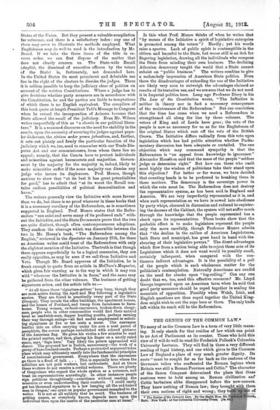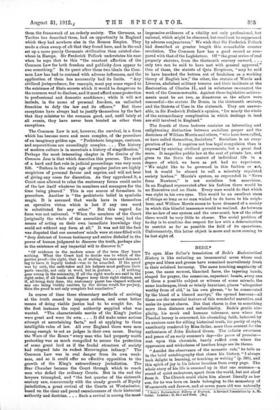THE GENIUS OF THE COMMON LAW.*
To many of us the Common Law is a term of very little mean- ing. It only stands for that residue of law which can point to no Act of Parliament as its creator. Those who hold this view of it will do well to read Sir Frederick Pollock's Columbia University Lectures. They will find in them a very different reading of legal history, and one which gives to the Common Law of England a place of very much greater dignity. Its roots " must be sought for as far back as the customs of the Germanic tribes who confronted the Roman legions when Britain was still a. Roman Province and Celtic." The character of the Saxon Conquest determined the place that these customs were to hold among us. Roman civilization an? Celtic barbarism alike disappeared before the new-comers. They knew nothing of Roman law; they broug't them
their own notions of right and wrong ; they b t of
• The Genius of the Common Law. By the Bight Hon. Sir k hooks Bart. Now York : at the Columbia university Pr. C.614
them the framework of an orderly society. The Germans, as Tacitus has described them, had an opportunity in England which they had nowhere else in the Roman Empire. They made a clean sweep of all that they found here, and in the end set up a more purely Germanic civilization than existed else- where in Europe. Sir Frederick Pollock understates his case when be says that to this "the constant affection of the Common Law for both freedom and publicity does appear to owe something." In its quest after these two ideals the Com- mon Law has had to contend with adverse influences, and the application of them has necessarily had its limits. " Any civilized jurisprudence, for example, must pay some regard to the existence of State secrets which it would he dangerous to the common weal to disclose, and it must afford some protection to professional and domestic confidence ; while it will Rot include, in the name of personal freedom, an unlimited franchise to defy the law and its officers." But these exceptions have always had to justify themselves by the fact that they minister to the common good, and, until lately at all events, they have never been treated as other than exceptions.
The Common Law is not, however, the survival, in a form which has become more and more complex, of tie procedure of an imaginary golden age. "Prehistoric language, customs, and superstitions are exceedingly complex. . . . The history of modern culture is in essentials a history of simplification." Perhaps the most interesting chapter in The Genius of the Common Law is that which describes this process. The need of a hard and fast rule in judicial proceedings was very soon felt. "Suitors in the early age of regular justice are highly suspicious of personal favour and caprice, and will not hear of giving any room for discretion. As they apprehend it, a Court once allowed to relax the customary forms could make of the law itself whatever its members and managers for the time being pleased." This is one source of formalism in procedure. Another is "the prehistoric belief in symbolic magic. It is assumed that words have in themselves an operative virtue which is lost if any one word is substituted for any other." But this regard for form was not universal. " When the members of the Court [originally the whole of the assembled free men] had the means of acting on their own immediate knowledge they could act without any form at all." It was not till the fact was disputed that our ancestors' minds were at once filled with " deep distrust of human testimony and entire disbelief in the power of human judgment to discover the truth, perhaps also in the existence of any impartial will to discover it."
" Of evidence in the modem sense of the term they knew nothing. What the Court had to decide was to which of the parties proof—the right, that is, of stating his case and demand- ing to havo it legally tested—was to be awarded. If the proof was by oath, the oath-taker and his helpers must perform their parts exactly, not only in word, but in gesture. . . . If nothing goes wrong in the solemnity, if all the right words are said in the right order, if all hands and fingers keep their right station, and if, all being duly done, the customary pause has elapsed without any one being visibly smitten by the divine wrath for perjury, then the proof is not only complete but conclusive."
In course of time these elementary methods of arriving at the truth ceased to impress suitors, and some better means of doing visible justice had to be sought for. In the first instance the royal authority supplied what was wanted. "The characteristic merits of the King's justice were great and were its own. . . . It did make some serious attempt at ascertaining facts," and at applying to them intelligible rules of law. All over England there were men strong enough to act as judges in their own cause. During the Wars of the Roses " every man who had property worth protecting was as much compelled to secure the protection of some great lord as if the feudal structure of society bad relapsed into its rudest Merovingian infancy." The Common Law was in real danger from its own weak- ness, and so it could offer no effective opposition to the growth of the King's extraordinary jurisdiction. The Star Chamber became the Court through which to reach men who defied the ordinary Courts. But in the end the lawyers triumphed, and " the last quarter of the sixteenth century saw, concurrently with the steady growth of Equity jurisdiction, a great revival of the Courts at Westminster, based on the clear and proud consciousness of their historical authority and doctrine. . . . Such a revival is among the moat impressive evidences of a vitality not only professional, but rational, which might be obscured, but could net be suppressed by adverse conjunctures." We wish that Sir Frederick Pollock had described at greater length this remarkable counter revolution. The Common Law has a good record as com- pared with that of the Legislature. Of " the great series of real property statutes, from the thirteenth century onward, . . . only two can be said to have met with general approval." One of these, the statute of Qnia Eruptores, "may be said to have knocked the bottom out of feudalism as a working theory of English law," the other, the statute of Wards and Liveries, abolished military tenures and their incidents at the Restoration of Charles IL, and in substance re-enacted the work of the Commonwealth. Against these legislative achieve- ments must be set two, as disastrous as the others were successful—the statute De Donis, in the thirteenth oentury, and the Statute of Uses in the sixteenth. They are answer- able, in Sir Frederick Pollock's opinion, "for nearly the whole of the extraordinary complication in which dealings in land are still involved in England."
The fourth of these lectures contains an interesting and enlightening distinction between socialism proper and the doctrines of William Morris and others, "who have been ca/led, or have called themselves, Socialists." Socialism is an exag- geration of law. It requires not less legal compulsion than is imposed by existing civilized governments, but a great deal more. It magnifies public law at the cost of private law, and gives to the State the control of individual life in a degree of which we have as yet had no experience. " We might like to be governed in this fashion or sot, but it would be absurd to call a minutely regulated society lawless." Morris's system, as expounded in " News from Nowhere," is not socialism but anarchism. In an England regenerated after his fashion there would be no Executive and no State. Every man would do that which was right in his own eyes. This would be an excellent state of things so long as no man wished to do harm to his neigh- bour, and William Morris seems to have dreamed of a society in which this blissful innocence would be realized. As between the no-law of one system and the over-much law of the other there would be very little to choose. The social problem of to-day is to combine due respect for law with a determination to restrict as far as possible the field of its operations. Unfortunately, this latter object is more and more coming to be lost sight of.



































 Previous page
Previous page